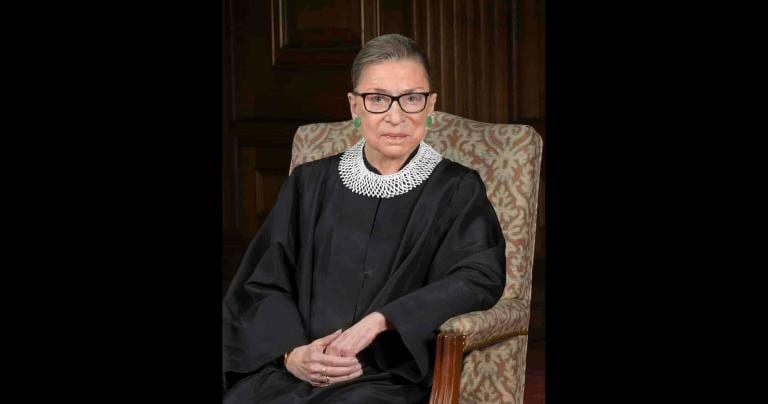I screamed “NO!” when I heard the news.
Justice Ruth Bader Ginsburg is dead.
We thought she would live forever… or at least for another five months. And why shouldn’t we? She beat colon cancer in 1999, then beat pancreatic cancer in 2009 and again in 2019. But it returned this year. She willed herself to stay alive until her replacement could be appointed by someone more in line with her philosophy of the Constitution.
Her will was strong, but she was still human.
She was 87.

A brief biography
Joan Ruth Bader was born in Brooklyn on March 15, 1933. Her father was a Jewish immigrant from the Ukraine; her mother was from New York, part of a family of recent Jewish immigrants from Europe. Both worked blue collar jobs during her childhood.
Ruth graduated from Cornell University in 1954, then married Martin Ginsburg. She moved to Oklahoma with him when he was in the Army. She started Harvard Law School in 1956, one of nine women in a class of 500. When Martin graduated from Harvard and got a job in New York City, she transferred to Columbia Law School, where she graduated first in her class in 1959.
Ruth and Martin had two children: Jane (born 1955) and James (born 1965).
She worked as a law clerk, a research associate, and a law professor. In 1973 she became the general counsel for the Women’s Rights Project of the ACLU. She was appointed to the U.S. Court of Appeals by President Jimmy Carter in 1980, and to the U.S. Supreme Court by President Bill Clinton in 1993. She was confirmed by a vote of 96-3.
The Senate was a very different place in those days.
60 years of legal excellence
USA Today has a list of Ruth Bader Ginsburg’s most notable opinions as a Supreme Court Justice. The first is United States v. Virginia (1996), where the court struck down Virginia Military Institute’s male-only admissions policy as a violation of the 14th Amendment’s Equal Protection Clause. In it she said
A law or official policy that denies to women, simply because they are women, equal opportunity to aspire, achieve, participate in, and contribute to society, based upon what they can do … is presumptively invalid.
Last year she wrote the opinion for a unanimous decision that the 8th Amendment’s prohibition against excessive fines applies to states and local governments and not just the federal government.
The protection against excessive fines guards against abuses of government’s punitive or criminal law-enforcement authority. This safeguard, we hold, is fundamental to our scheme of ordered liberty.
Ginsburg is perhaps best known for her dissents, especially Ledbetter v. Goodyear Tire & Rubber Co. in 2007 (on pay discrimination on account of gender), Gonzales v. Carhart in 2007 (on abortion restrictions), and the infamous Hobby Lobby case in 2014, where she wrote
Approving some religious claims while deeming others unworthy of accommodation could be perceived as favoring one religion over another, the very risk the Establishment Clause was designed to preclude. The court, I fear, has ventured into a minefield.
She was known as a brilliant jurist and was respected even by arch-conservative Justice Antonin Scalia. She worked tirelessly for the rights of all, but especially for those who have long been denied them.
She will be missed.
This shouldn’t matter so much
Ruth Bader Ginsburg’s story is inspiring and her service to her country was outstanding. Right now we should be pausing to honor her life, not crying in despair. A judge – even a great judge – shouldn’t be this important. As Chief Justice John Roberts said during his confirmation hearing, the job of the judge is to “call balls and strikes, not to pitch or bat.”
But the history of American government has been one of saying and writing noble ideals and then failing to live up to them. It falls to the judiciary to hold politicians accountable to their commitments. Sometimes they have (Brown v. Board of Education, Obergefell v. Hodges) and sometimes they haven’t (Dred Scott v. Sandford, Citizens United v. FEC).
Congress has abdicated its responsibility to lead. No one wants to go on record voting for something controversial; most are more interested in getting re-elected than in actually getting something done. Congress’s inaction has left a power vacuum that the courts have filled out of necessity.
And nowhere has this been more important than with individual liberties and basic human rights.
But it matters a lot
When Mitch McConnell stole President Obama’s appointment of Merrick Garland, at least the judicial mix of the Supreme Court remained the same. But then Anthony Kennedy retired and was replaced by Brett Kavanaugh. Kennedy was very pro-business, but also progressive on social issues – he wrote the majority opinion that established marriage equality as the law of the land. John Roberts tries to be a centrist and sometimes delivers, but sometimes not.
If Trump is allowed to fill Ruth Bader Ginsburg’s seat with another conservative, the mix of the court will shift, likely for at least a decade. Conservatives are anxious to overturn Roe v. Wade, but they’d also like overturn rulings on marriage equality, decriminalization of same sex conduct, and the ruling that underpins them all: Griswold v. Connecticut (1965), which legalized contraception and established the right to privacy.
Plus we haven’t just lost Ginsburg’s reliable progressive vote. We’ve also lost her legal reasoning and advocacy skills. Her voice was sometimes enough to persuade a more moderate justice to abandon Clarence Thomas and Samuel Alito’s thinking and join with hers.
Ginsburg’s position as senior justice on the liberal wing now falls to Stephen Breyer, who is 82. Her role as the most visible female jurist in the country falls to Sonia Sotomayor and Elena Kagan. They all have huge shoes to fill.
First we mourn
The outpouring of grief since last night is far more than the fear of a remade Supreme Court. We didn’t just respect Ruth Bader Ginsburg’s legal work, we loved her as a person. We called her “the Notorious RBG” – she loved the name. We loved her intellect, her determination, her wit, and her humanity.
And so we mourn.
My Jewish friends tell me that comments referring to an afterlife are considered inappropriate at times like these. Contemporary Judaism is rather ambivalent about an afterlife, preferring to focus on our actions in this life. We do not know what Justice Ginsburg believed or expected, if anything. We should honor her Jewishness and respect that tradition.
Instead, the proper words are “may her memory be a blessing.”
I am confident it will be.
And then we act
Mitch McConnell has already said that Trump’s nominee will get a vote. He has some twisted logic as to why that’s right even though he denied a vote to Merrick Garland, who was nominated almost 8 months prior to the 2016 election. His clear goal is to put as many conservatives on the Supreme Court as possible, principles and logic be damned.
The Senate has 53 Republicans, and Vice President Mike Pence breaks any ties. We need four Republican senators with the integrity to insist that the precedent McConnell set in 2016 is respected in 2020.
If you live in a state with a Republican senator, write and call them and insist that no confirmation vote take place until after the inauguration in January.
It is unlikely a vote could be held prior to the election. Expect McConnell to try to ram it through in the lame duck session in November and December.
Vote – elections have consequences!
This was the #1 reason I voted for Hillary Clinton in 2016. Donald Trump has put 200 conservatives on the Federal bench, out of about 800 positions. He’s already put two young conservatives on the Supreme Court and may very well get a third.
Will Stephen Breyer live another five years? I don’t even want to think about the damage a 7-2 conservative court would do to the country.
Vote for Joe Biden for President. Whatever your misgivings about him, at least he’ll stop the bleeding.
Work to flip the Senate. I donated to Amy McGrath, who’s running against Mitch McConnell in Kentucky. That’s a tough race. CNN lists eight seats more likely to switch from red to blue, plus two more in danger of flipping to the Republicans. If you have money to contribute to an out-of-state candidate, pick one of these.
Vote for progressives in state and local elections. Government is so much more than the President and the Supreme Court. Most of the regressive laws passed in recent years have come from Republican state legislatures.
I’ve seen several people saying that if an 87-year-old judge was the only thing holding our system together, it wasn’t a very good system to begin with. I won’t argue with that, and I’m open to suggestions to make things better.
But making things better begins with stopping the bleeding.
Vote.
Become the legacy of Ruth Bader Ginsburg
I am distraught over yet another significant loss in this year from hell, losses exacerbated by injustice and misrule.
Still, I cannot help but be inspired by the life of Ruth Bader Ginsburg. Defending our rights was her life’s work and she kept fighting until the very end.
I said it’s the job of the judiciary to hold politicians accountable for living up to the ideals of this country, and that is true. But first and foremost, holding them accountable is our job as citizens. If there was ever a time to take that job seriously it’s now.
Democracy only works with an engaged citizenry.
I do not know if I have the resiliency and determination of the Notorious RBG – I’ve never been challenged to the extent she was challenged. She had a strength few of us have.
But what strength I have I will use to fight on, for justice, fairness, and compassion.
Let’s make RBG proud.




















